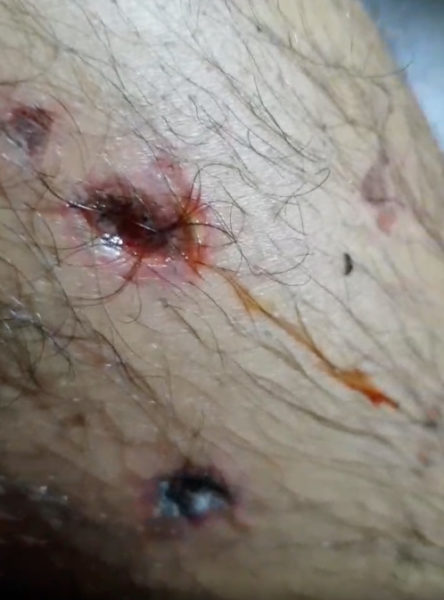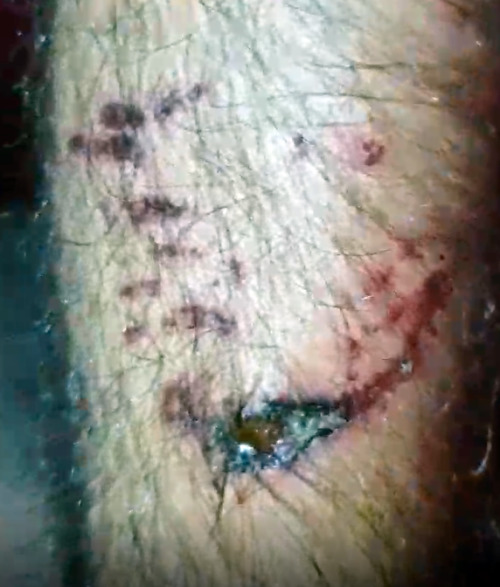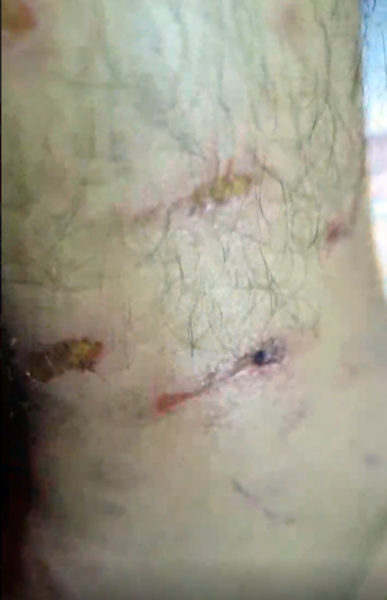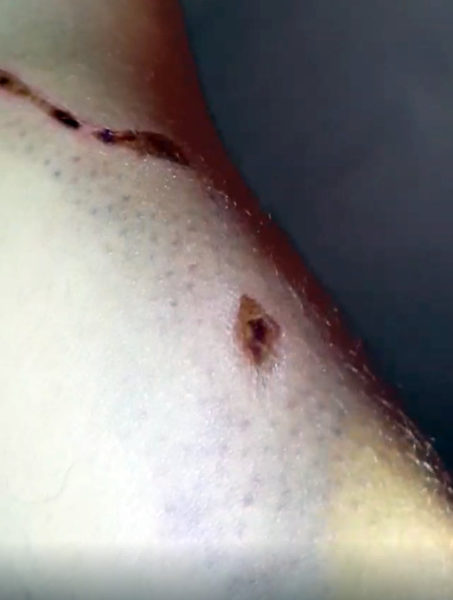This testimony documents four consecutive pushbacks. The first two were a chain pushback from Bulgaria via Greece to Turkey, the third back from Turkey to Greece and the fourth from Greece to Turkey again. In total, the pushbacks included over 400 people, between the ages of 1 to 50 years including men, women, unaccompanied minors and families with small children. The people pushed back were exposed to a variety of physical violence including dog attacks, gunshots and incidents of potential drowning.
- The first pushback from Bulgaria to Greece included twenty-seven people from Iraq, Morocco and Algeria with several women and children.
- The second pushback from Greece to Turkey concerned 200-300 people including Algerian, Pakistani, Moroccan, Afghan, and sub- saharan African citizens.
- The third pushback concerned the same group back from Turkey to Greece.
- The fourth pushback included a part of that same group back to Turkey again.
The 19 year old male respondent and eight other men crossed the border to Greece close from Uzunköprü 15 days before the first pushback. The group was composed of five Algerians and four Moroccans between the ages of 17-24. They had been sleeping in a forest on the Turkish side for several days because every time they attempted to cross the Evros river, they saw patrols on the Greek side and went back and waited to try another time. It was only after five days they did not see any police and crossed the border at 11pm.
They walked through the forest for an hour and a half and arrived at a train line, which they followed for an hour. They kept seeing police cars and had to hide frequently.
“In Greece, someone calls the police to say there are migrants here, they will get 100 euros. That’s why you should hide” the respondent remarked.
They continued walking for several days. Their food and water was about to run out, so they started drinking water from the ground on the fourth day. On the sixth day, October 26, they saw lights of a police patrol, the police were not in uniforms. There was a car, which was visually identified as a green sage police car. The respondent explained that he and most others tried to lie down so the police could not see them, but two of the group got scared and started to run. The respondent stated they did not know what to do as if the police saw the guys running, they would also see the others hiding, so they all ran and threw their bags away.
They hid for an hour and a half in a forest, waiting for the police to leave. But seven policemen came with a dog and found them. The police also were wearing night vision goggles, which is how the respondent thinks they found the group. The police were dressed in green uniforms with police written on the chest of the uniform. The police were visually identified as Bulgarian border police. They unleashed dogs and one of them bit the respondents jacket. The police were screaming at them to come out of the forest. The men decided to climb a hill to try and get away from the police, but it was hard to find a way. One man got left behind as he could not find a way up. He eventually arrived with lots of wounds on his face and hands. The police then found them again.
“The police started to hit us with no mercy,” the respondent explained. Their dog started biting his leg. They continued to hit him and his friends on their shoulders and backs with big sticks and the dog continued to bite him until a police car arrived to take them to a detention centre. The dog was large, and while the dog was biting him the police were laughing. The respondent explained that the dog bit him first on the jacket, then on the legs of two of his friends. While the police were hitting them, the dog continued to bite his friend many times. Two blue cars arrived and they were split into the cars to take them to a detention centre. Seven people were put into one. Two of his friends were hiding, and were not found by police. They were still in Bulgaria on the day of the recording.
When they arrived at the detention centre, they did not go inside. The detention centre was one level and there were two grey cars outside. They were asked by the normal-clothed police where they were from via a translator (who was identified as Bulgarian as could communicate with officers but spoke to the respondent in English) and had their belongings taken from them. They had their phones taken from them and had their passwords changed. They were also ordered to empty their bags and to leave all their belongings in the centre. They were then taken to another detention centre at the Bulgaria-Greece border. This centre was a small building and inside there were many people. Some of the police had balaclavas on. The respondent and his friends were hit and ordered to remove their shirts and shoes. The respondent and the rest of his group were left only wearing a shirt and had their pants cut. No shoes, trousers or warm clothes. It was very cold. The Bulgarian police pushed them back to Greece. As they were being pushed back, they were being hit with sticks on their legs and backs.
The seven men crossed into Greece and stayed in a forest overnight. By that time they had not had any food or water for two days. One of the members still had 20 euros and wanted to get food. When he went to a cafe, he asked for the police to be called. The police arrived in a white car with police written in blue writing, resembling a Greek police car. One was wearing Greek border police uniform and two were wearing green uniforms.
The Greek police asked them where they were from, and then the military were contacted who took them to a ‘camp’ an hour from the Bulgaria border in a small military truck. The detention site was then subsequently described as a one storey building with cells, and no food was given out (except for families), but the reason it was called a camp is because the police referred to it as so.
They stayed in the camp for one day, and then a large truck took them to another place. There were already 20 people in the camp, in addition to respondent and his six friends. Here the respondent met a family of two women, three little children, one baby and three men from Kurdistan. This family had been there for two days. Then, the people in this detention site were put in a big lorry. There were about 30-40 people in this lorry, with little air and it was hard to breathe. They were then put into smaller cars to be taken to the Greek-Turkish border. The cars were described as white Mercedes sprinters.
When they arrived at the border, there were many people. About 200-300, many Pakistanis and Afghans. The people were told not to make any noise by the masked men who were pushing them all back to Turkey. A boat driven by a Syrian and Moroccan, who were both wearing balaclavas, took them across the Evros river. The Syrian and Moroccan hit those that spoke with a metal stick. They dropped them in the middle of the river and told them to get to the Turkish side. Some of the group did not know how to swim and were shouting as the currents were strong. People were taken to the middle of Evros river in a rubber blow up dingy, 10 at a time.
When they arrived on the Turkish side, they hid. They were caught by Turkish army nevertheless who proceeded to hit them.
They told them to go back to Greece. The respondent explained it was cold and their clothes were wet and they did not even have their shoes or jackets. They explained to the soldiers that they were wounded, but the police insisted that they go back to Greece. The Turkish soldiers continued to hit them and threw them into the river. Since some of the men did not know how to swim, the police gave them a black and red blow up raft to use. The Turkish soldiers were firing their guns in the river and throwing stones at them to force them to go back to Greece. The seven of them went by boat across to Greece, which then the boat was subsequently taken back by the Turkish soldiers.
Two of the respondents’ friends were able to go back to Turkey because the Turkish police did not see them. The rest of the group went to the Greek side and there was no police. They waited until the morning on the Greek side, before trying to find a way to cross back but they came across the Turkish soldiers who told them they could not come back. When they were looking for a boat to go back to Turkey, they saw old mines that if someone stood on, they would explode.
They walked along Evros for five hours on the Greek side towards Edirne to find a boat and found many on the shore, but all were broken.. They had no choice but to go to the Greek police. They eventually arrived in a military area and told them about their situation. The Greek military spoke to them in English and asked them what had happened. The respondent explained they were hit by the Turkish military and said they wanted to go back to Turkey. The respondent mentioned that he noticed one of the Greek soldiers was filming them and that while they were filming, the Greek military were speaking to them in a kind way.
“The Turks are your brothers, why did they hit you?” one of the Greek soldiers proclaimed. The military leader asked if anyone was injured and gave them medicine. They were given food and water as well. The respondent was told by the military that they would be taken to hospital to be treated, and they said they would help them. But the respondent explained it was all a lie. When they had finished filming, the soldiers called the police. The police took them to the same detention site they had been kept in previously in a white truck.
They stayed there until the middle of the night, when they were piled into a truck and hit as they were doing so. The truck was full of people and it was hard to breathe. After three hours, they arrived at a place where they were divided into smaller cars to be taken to the border.
Masked police wanted to throw them into the water. The first group was from Pakistan and the river was deep with fast currents. The Pakistanis explained they could not swim and started to shout. There were also African women and one of them started to shout and then fell unconscious.
The masked police then took them to another point on the river and divided them by their nationalities: Pakistani, Moroccan, Afghan, and Africans. The respondent was put in a boat of ten people, four Algerians and six Moroccans. They were dropped in the middle of the river. There was a young Moroccan who could not swim and he was holding on to the respondent. The respondent was injured because of the dog. Two of the Moroccans that could swim crossed and the respondent could not. The young Moroccan who was holding on to the respondent was taken away by the current.
“Only two Algerians knew how to swim, you saw people walk but the current took them away” he explained. “The people who couldn’t swim were shouting”.
The respondent was eventually able to cross, and arrived on the Turkish side with two Algerians, no Moroccans. Those that could not cross were shouting. The Turkish soldiers were there searching with lights, but they did not see the respondent and the two Algerians. The respondent and his two friends then crossed through a forest, walked for five hours until they reached a village where a taxi driver offered them food and water. He then took them to Istanbul.
He has not heard from his four friends who disappeared in the river and believes they must have drowned.




